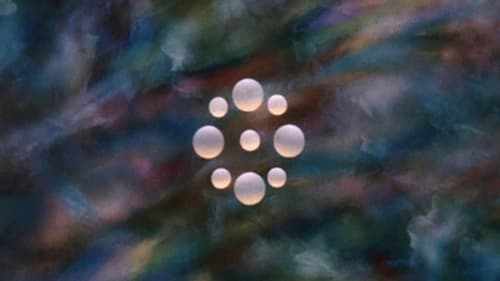End.
Stuck? Run.
Genre : Thriller
Runtime : 4M
Director : Aslı Çakmak
Synopsis
She attempts to escape her patterns.

In 1944 Lye moved to New York City, initially to direct for the documentary newsreel The March of Time. He settled in the West Village, where he mixed with artists who later became the Abstract Expressionists, encouraged New York’s emerging filmmakers such as Francis Lee, taught with Hans Richter, and assisted Ian Hugo on Bells of Atlantis. Color Cry was based on a development of the “rayogram” or “shadow cast” process, using fabrics as stencils, with the images synchronized to a haunting blues song by Sonny Terry, which Lye imagined to be the anguished cry of a runaway slave. —Harvard Film Archive

ĀTMAN is a visual tour-de-force based on the idea of the subject at the centre of the circle created by camera positions (480 such positions). Shooting frame-by-frame the filmmaker set up an increasingly rapid circular motion. ĀTMAN is an early Buddhist deity often connected with destruction; the Japanese aspect is stressed by the devil mask of Hangan, from the Noh, and by using both Noh music and the general principle of acceleration often associated with Noh drama.

Early Abstractions is a collection of seven short animated films created by Harry Everett Smith between 1939 and 1956. Each film is between two and six minutes long, and is named according to the chronological order in which it was made. The collection includes Numbers 1–5, 7, and 10, while the missing Numbers 6, 8, and 9 are presumed to have been lost.

100 basic images switching positions for 4000 frames.

A live action footage of a smiling, bespectacled (presumably) Western tourist set against the familiar cadence of an accelerating train revving up as it leaves the station sets the mesmerizing tone for the film's abstract panoramic survey of an Ozu-esque Japanese landscape of electrical power lines, passing trains, railroad tracks, and the gentle slope of obliquely peaked, uniform rooflines as Breer distills the essential geometry of Mount Fuji into a collage of acute angles and converging (and bifurcating) lines .

Takashi Makino’s source of inspiration, our place in the world and the universe, never seems to dry up in view of the never-ending flow of immersive films. Generator may well be the earthiest of his films so far, made as a reaction to the Fukushima disaster. A reality check, but in the world that Makino shows, this can never be achieved without looking inwards too.

An experimental short film by Walerian Borowczyk and Jan Lenica.

Polish avant-garde animation in which a periodic series of aggressive starbursts interrupt the melodic dancing of fluid shapes, one raid even freezing the image for a moment.

"Momentum is Belson's most serene and gentle film since Allures. This treatment of the sun as an almost dreamlike hallucinatory experience is both surprising and curiously realistic." -Gene Youngblood

An essay in colour harmonics and visual overtones. Conceived and produced as part of the Images Film Festival's Minute Movies.

The enduring romance of the lines. A visual exploration of Dave Brubeck's jazz classic "Take Five".

Len Lye usually timed his films with great care to match their soundtracks, but for All Souls Carnival, he and composer Henry Brant worked separately, preferring to see if the score and visual track would synchronise by chance. Lye also experimented with a new Direct Film technique, drenching the filmstrip in colourful paint and marker pen.

Overripe with psychosexual poetry and stark, oneiric rituals, Adachi's filmmaking debut, made while he was still an undergraduate, counts among the more resonant accomplishments of the now famous Nihon University Film Club. Adachi's obvious fascination with the wide-eyed watchfulness of childhood and the uncanny is an expression of the important surrealist strand running throughout the post-WWII Japanese avant-garde. - Harvard Film Archive

For this film, Takashi Makino allowed himself to be inspired by the earth. In a never-ending stream of images, we recognize elements from the forest that he then reduces to an abstraction. The film came about as a classical composition in which the picture and the musical contribution of Jim O’Rourke link up seamlessly and lead the mood in turn. A sense of freedom is what predominates.

Short experimental animation.

A synthesized video environment.

This animated short is a play on motion set against a background of multi-hued sky. Spheres of translucent pearl float weightlessly in the unlimited panorama of the sky, grouping, regrouping or colliding like the stylized burst of some atomic chain reaction. The dance is set to the musical cadences of Bach, played by pianist Glenn Gould.

Animator Ryan Larkin does a visual improvisation to music performed by a popular group presented as sidewalk entertainers. His take-off point is the music, but his own beat is more boisterous than that of the musicians. The illustrations range from convoluted abstractions to caricatures of familiar rituals. Without words.

“The changing dots, ectoplasmic shapes and electronic music of L. Schwartz’s ‘Mutations’ which has been shot with the aid of computers and lasers, makes for an eye-catching view of the potentials of the new techniques.” – A. H. Weiler, N. Y. Times

Consistent stylistic-thematic structures link and merge throughout the bewildering event chain. The distinction between organic forms and human artifacts is blurred by the visual style which is enigmatic without being ambiguous.













